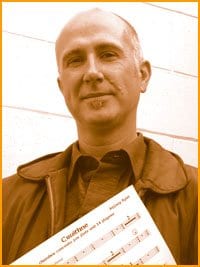Jeffrey Ryan’s first musical memory, at age two, is maybe not what you would expect a classical composer’s to be.
In 1964, British singer Petula Clark had her first number one hit in North America, Downtown. “It’s the first recording I ever owned,” Ryan says, remembering the night his father came home with a 45-rpm single in his hand after spending days trying to locate the fast-selling tune in neighbourhood record shops.
It was only later that Ryan was drawn to the more serious music he now makes his living writing.
Fast-forward a decade to a teenaged Ryan, born in Toronto and growing up in Fergus, Ontario. Two pivotal moments in his young world lead him to a life of studying and composing classical music: hearing Igor Stravinsky’s The Rite of Spring for the first time and attending a Hamilton Philharmonic performance of Gustav Holst’s The Planets.
The Vancouver Symphony Orchestra’s (VSO) composer-in-residence vividly recalls these moments of epiphany. “I remember thinking, oh my god, this is fantastic! I never knew music could be like this. [The Planets] is the piece that made me want to be a composer.”
Until then, Ryan had grown up on a steady diet of pop music, including The Captain and Tennille, England Dan and John Ford Coley, Patsy Gallant and, like millions of other kids, watched ABC-TV’s The Partridge Family and its heartthrob star singer David Cassidy. In fact, a Cassidy concert in the early ’70s at Toronto’s Canadian National Exhibition was his very first live musical experience when he was around 10 or 11 years old.
“Kim Carnes was the opening act. I still have the ticket stub!” Ryan proudly declares.
If a love for Petula Clark, David Cassidy and The Captain and Tennille weren’t clues enough-yes, Ryan, 42 (and single, by the way) is gay.
He’s been out since high school (he dated a fellow band member) and was one of the founders of Wilfred Laurier University’s gay student association, GLOBAL.
Ryan didn’t take his first piano lessons until he was 15 (late by conventional standards) and was originally enrolled at Wilfred Laurier to study business. That only lasted a couple of months, though.
“I was completely unhappy in business classes. My brain didn’t work that way,” Ryan recalls. He switched to the Faculty of Music, eventually earning a Master’s Degree in composition from the University of Toronto before moving on to the Cleveland Institute of Music to further his studies and then begin teaching.
So, does being gay influence or shape his music in any way? “I knew you were going to ask that,” Ryan laughs. “It’s absolutely impossible to answer because I’ve never been a straight composer. I don’t know if it makes any difference.”
He does allow that his sexuality has perhaps given him added freedom to pursue his chosen career path. “I haven’t had to worry about providing for my children” like a straight, married person would have to, he explains. It made his decision (at age 36) to quit teaching and devote himself full-time to composing easier.
Although not a major feature of his composing, queerness has shown up in Ryan’s work. He has used the poems of Greek poet CP Cavafy (1863-1933) to compose music for baritone and piano under the title Of Passion’s Tide. Cavafy had several romances with men and dealt with homosexuality frankly in his work.
Also, Ryan’s personal love life has come out in his writing a couple of times: the orchestral piece Vesica Piscis was inspired by a romance, for example. And an incomplete score was borne from the ashes of a failed love.
“Years ago I had a really bad breakup where I was quite devastated. I started writing a viola duo called Finishing Business and there was a lot of anger in that piece.”
Now in his third year with the VSO, Ryan, in addition to his educational, administrative and composing duties, is curator of the orchestra’s Roundhouse Series, which has its first concert of the season Jan 21. The theme is Musical Visions of the Planet Earth and will include the world premiere of Ryan’s Cruithne, as well as other contemporary works by fellow Canadians Hildgard Westerkamp, T Patrick Carrabre and Jason Nobles, among others.
All the pieces relate somehow to our planet and its relationship to space. Cruithne (it means “corn eater” in Gaelic) is an asteroid that shares our orbit but somehow avoids colliding with us.
Ryan likes the tension that image suggests. “Primarily my music is about the overall shape and the rhythmic propulsion,” he explains. “Your body wants to respond to it by moving.”
The VSO’s Roundhouse concerts are in their second year and give concert-goers a chance to catch the musicians in a more intimate venue (around 250 people) and with a smaller orchestra than normal (a maximum of 20 pieces).
“It’s a risky venture in many ways,” says Ryan, but last year’s shows sold out and he’s hoping for more of the same in 2005.
“Bramwell [Tovey, the VSO’s musical director] basically said ‘this is your baby, you program it.'”
Ryan says he relishes the opportunity and loves working with Tovey and the symphony in general. “It’s a great place to work,” he enthuses, adding that “there’s no need to hide” who he is.
Music lovers will also get a chance to hear more from Ryan when his piece Violet Crumble (named after an Australian chocolate bar) is played by the full VSO orchestra Feb 19 and 21 at the Orpheum. The program also includes Canadian violinist James Ehnes performing the Walton Violin Concerto and Tchaikovsky’s Sixth Symphony.
MUSICAL VISIONS OF THE PLANET EARTH.
Fri Jan 21, 8 pm.
Roundhouse Community Centre.
VIOLET CRUMBLE.
Feb 19 and 21, 8 pm.
Orpheum Theatre.
604-876-3434.
www.vancouversymphony.com.

 Why you can trust Xtra
Why you can trust Xtra


